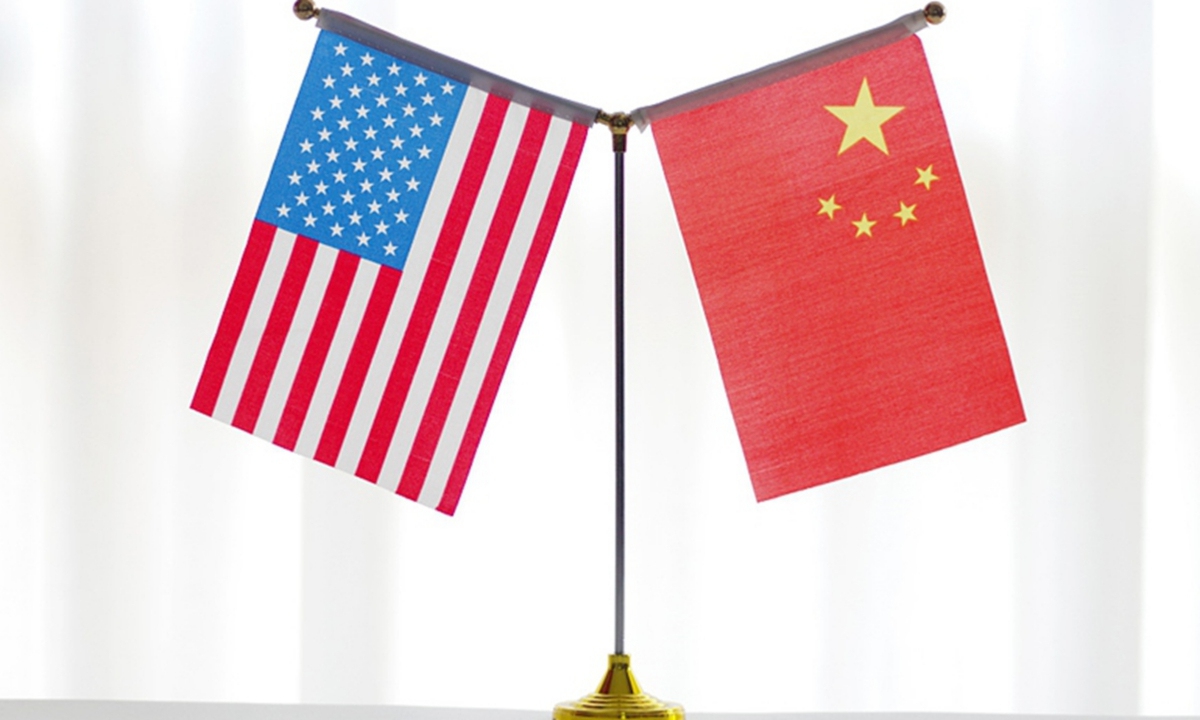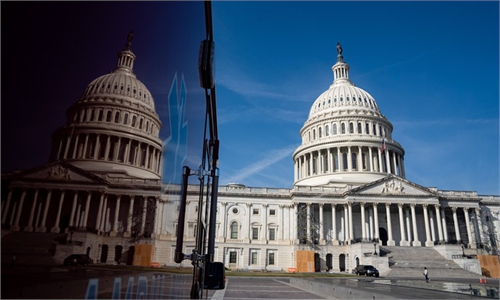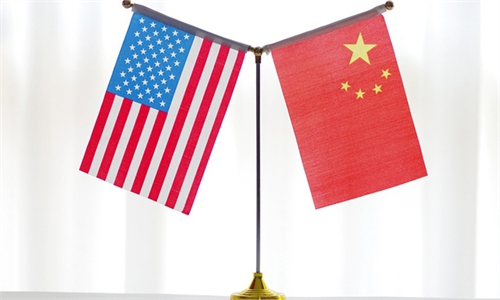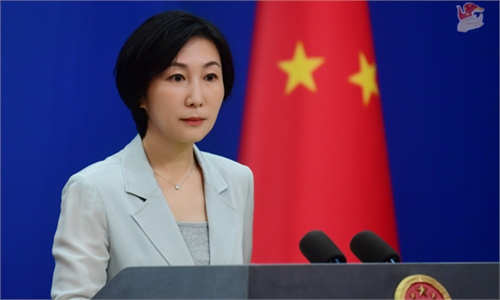China, US ‘candid’ trade talks in Washington pave way for addressing ‘core issues’ in ties
Exchange paves way for addressing ‘core issues’ in frayed ties

China US File Photo:CFP
China's commerce minister met with US commerce secretary and US trade representative in the US on Thursday and Friday respectively and held "candid" talks in a move that Chinese analysts said could be a prelude to further high-level engagement between the world's two largest economies and could pave the way for China-US trade and economic ties to play more of a ballast role to help improve frayed bilateral relations.
However, the resumption of high-level interactions comes with Washington's provocations and attempts to crack down on China in many fields, prompting calls for the US to adjust to a rational, realistic perception of China and to respect China's stance and bottom line.
China's Minister of Commerce Wang Wentao met with US Commerce Secretary Gina Raimondo in Washington on Thursday before attending the 2023 APEC Ministers Responsible for Trade Meeting in Detroit. The two sides had "candid, professional and constructive exchanges" of views on China-US economic and trade relations as well as issues of common concern, China's Ministry of Commerce (MOFCOM) said in a statement on its website on Friday morning.
The Chinese side expressed key concerns on the US' economic and trade policies toward China, on semiconductors and export controls, as well as its outbound investment reviews, according to MOFCOM.
Wang also met with US Trade Representative Katherine Tai on Friday and the two had "candid, pragmatic and in-depth exchanges" of views on China-US economic and trade relations as well as regional and multilateral issues of common concern, according to MOFCOM.
The Chinese side expressed concerns regarding key issues, including the US economic and trade policies toward China, Taiwan-related topics in the economic and trade domain, the Indo-Pacific economic framework and Section 301 tariffs. Both parties agreed to maintain communication.
The meetings between the Chinese commerce minister and US commerce secretary and trade representative, along with the recent resumption of high-level engagements between Beijing and Washington, are one of the most important meetings between the two countries after the US shot down an unmanned Chinese civilian airship and hyped the "China threat", which drove China-US relations to a new low. It also happened after China's top diplomat Wang Yi and US National Security Advisor Jake Sullivan met in Vienna and held "candid, in-depth, substantive and constructive" talks for more than 10 hours on May 10 and May 11.
"China and the US have been maintaining the necessary communication, but the key is that the US cannot engage in communication and cooperation with China while continuing to hurt China's interests," Mao Ning, a Chinese Foreign Ministry spokesperson, said on Friday, noting that the US should meet China halfway to bring China-US relations back to the right track of sound and steady growth.
Significant meeting
Chinese experts said the Thursday meeting is of major importance, as it takes one step further the pledge by the leaders of the two countries from last year's Bali meeting to manage differences and disagreements and prevent confrontation and conflict.
It is believed that the meeting could help create an environment to solve, mitigate and manage differences in areas linked to trade and economic issues, the ballast of China-US relations, analysts said, holding the belief that such engagement could be a barometer of how much the two sides are heading toward the further restoration of high-level exchanges after months of recrimination.
The US' crackdown and containment of China in the field of advanced technology must stop and "The concerns raised by Minister Wang are clear, detailed and to the point," He Weiwen, a senior fellow at the Center for China and Globalization, told the Global Times on Friday.
The fact that the two ministers met for the first time since the pandemic in person in Washington showed that the working-level communications between the two sides have borne fruit, Gao Lingyun, an expert at the Chinese Academy of Social Sciences in Beijing, told the Global Times Friday.
According to MOFCOM, China and the US agreed to set up communication channels to maintain and strengthen exchanges on specific economic and trade issues in addition to areas of cooperation, meaning "some new channels could be set up for issues that cannot be solved by existing ones," Gao anticipated.
A readout from the US Department of Commerce said the discussions were "candid and substantive" and that the meeting was "part of ongoing efforts to maintain open lines of communication and responsibly manage the relationship."
Chinese experts said that the core issues hindering China-US trade and economic ties at the moment are tariffs and the US crackdown on Chinese companies.
The US side has come to realize that bilateral trade grew despite the trade war and that trade with China has win-win results, experts said, noting that the meetings between the Chinese commerce minister and Raimondo and US Trade Representative Katherine Tai could lead to trade ties playing an expanded ballast role in bilateral relations.
Experts said the Chinese side is making sincere efforts to improve bilateral ties.
China's new ambassador to the US, Xie Feng, who arrived at his post this week, said on his Twitter account that his mission is to enhance China-US exchanges and cooperation, and he looks forward to working with his American colleagues in the future.
Chinese Vice Minister of Commerce Wang Shouwen on Friday met with Colm Rafferty, chairman of the American Chamber of Commerce in China, and representatives from some American companies to exchange views on bilateral trade and economic relations, US companies' operations in China and China's business environment.
However, Chinese experts also warned against being overly optimistic about these meetings, despite the positive signals that came from them.
According to the US readout, Raimondo raised concerns about the recent spate of Chinese actions against US companies operating in China.
Chinese experts noted that legal action taken against some US consultancy firms and the cybersecurity review by relevant Chinese authorities on Micron's products sold in China have been carried out in accordance with the law and are based on facts. They should not be confused with or compared to the US' broad crackdown on Chinese companies under the pretext of national security.
The US has used national security as a pretext to put more than 1,200 Chinese companies and individuals on various lists and subjected them to all kinds of restrictions despite the lack of hard evidence of wrongdoing, spokesperson Mao Ning said at Wednesday's routine press briefing, noting that such moves constitute economic coercion and are unacceptable.
Mao on Friday also called on all parties to jointly oppose the US' economic coercion and bullying practices and safeguard the multilateral trading system following the US' grouping of its allies to contain China.
No easy path
Despite the resumption of high-level interactions between China and the US in the economic and trade fields, Washington has not reined in its provocations and attempts to crack down on China in many fields.
The US played a major role in hyping China-related topics at the just concluded Group of Seven (G7) summit in Hiroshima. The communiqué and other documents adopted at the summit smeared China and brazenly interfered in China's internal affairs.
Arms sales to the island of Taiwan continue as Taiwan media said the US $500 million sale through the Presidential Drawdown Authority had recently begun, and that FIM-92 Stinger missiles arrived at Taoyuan Airport on Thursday.
A bipartisan House committee on Wednesday adopted two reports recommending that Congress take action over China's Taiwan island and the Xinjiang region. The committee will focus on human rights before shifting to military and economic concerns, media reported.
Li Haidong, a professor at the Institute of International Relations at the China Foreign Affairs University, told the Global Times on Friday that the US wanted to engage with China on economic and trade issues due to its own needs, but will not abandon containment in other fields.
The US still upholds the old method of dealing with China based on strength - ordering China to cooperate according to US needs and creating problems to maximize its bargaining chips, while not respecting China's stance and bottom line, Li said.
The US' hegemonic mentality and paradoxical behavioral pattern are the crux of the difficulties in China-US relations, said Li, who urged the US to adjust to a healthy, rational and realistic perception of China's development, recognize that China's growing influence will not constitute a "threat," and handle China-US relations based on equality and mutual benefit, not hegemony and a new cold war.
Analysts acknowledge that due to the US' imbalance in its mentality and policy, fierce competition and confrontation will not disappear and China-US relations will continue to be very complex with interests and conflicts intertwined.
As two major powers in the world, the most likely scenario would be to engage in certain areas of common interests while being cautious in managing differences and avoiding conflicts, Li said.



